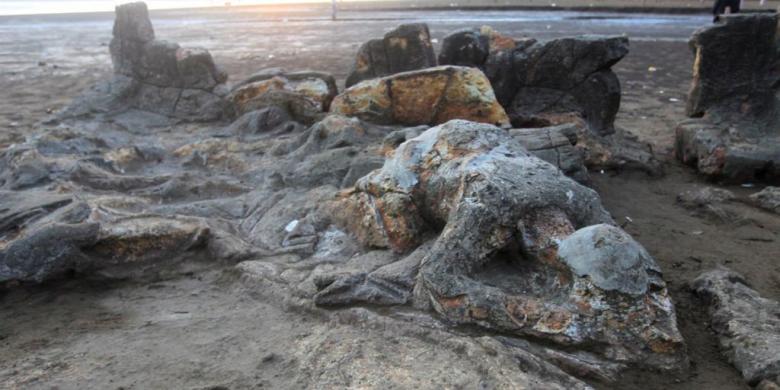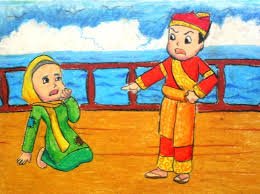Far, far away, on the coast of Western Sumatra near the mouth of the Batang Arau River, there is a large gray rock. It looks like any rock anywhere, but the people in the nearby fishing villages approach it with great awe, and not a little fear, and they bring their children to it to tell them its story. For the rock was once a ship–the ship of a fisherman’s son from their own neighbourhood, who sinned against his mother and was thus punished for his evil deed.

Here the story begins….
Most of the inhabitants of the village were poor. They made their living only by fishing; farming they did not know. One of the families, poorer than the rest, had one boy named Malin Kundang. Because he was their only son, they loved him more than was good for him, and they spoiled him, and as is so often the case, instead of returning their love and goodness to him, he became lazy and selfish and naughty, and a burden to them.
One morning, as Malin Kundang’s mother sat in their small cottage weaving cloth, Malin Kundang, as always looking for mischief, stole up quietly behind her and quickly grabbed her spool. He was about to run away with it when he fell, and the sharp point of the bobbin pierced his forehead just above the eyebrow. Weeping loudly, he ran back to his mother, who cleaned and bandaged his wound without delay and comforted her naughty child. The wound healed quickly, but it left a large scar.
One day Malin Kundang’s father heard that there was a ship at the delta whose captain was looking for additions to his crew. Malin Kundang was growing up, and his father, thinking only of his son’s good and his future, asked him whether he would like to sail. Yes, he would, said Malin Kundang. It seemed to him an excellent idea; he would go far away, to distant lands, to all the world.
And so he left his parents, and the village where he had grown up, and joined the crew of the large ship his father had told him about. His parents took leave of him with great sadness. In spite of his bad behavior he was still their only son, and they would now be alone again.
As was to be expected, no news came to the parents of their sailor son. Years passed; the father died, and Malin Kundang’s mother lived by herself–a lonely, poverty-stricken old women, whose one hope in the miserable world in which she lived, was to have some word from her son before her own life-span was ended.
Meanwhile, what of the son? He was in luck, Malin Kundang, this son of poor fisherfolk. The days of his apprenticeship as a common sailor were far behind. Not only was he a captain of ship; he was the owner of a fleet of merchant ships as well. Ships, houses, jewels, all the world’s goods he desired were his–and so he lived, adding to his possessions and to his wealth as he sailed from country to country, a prosperous, successful merchant and shipowner. Forgotten were the days of his youth, his parents, their love and kindness toward him. The traits of his boyhood, selfishness, indifference to the welfare of others, conceit–they were all emphasized as he had grown to man’s estate. Tall and straight he had grown–a handsome captain indeed–but the straight-ness was of pride and the bearing of the head showed conceit and superciliousness. This was Malin Kundang.

One day the villagers of the delta town of Batang Arau saw a large handsome ship, a foreign ship, in their small harbor. One whispered to another, and this one to again another, that the tall man standing on deck was none other than Malin Kundang. It had been years and years since Malin Kundang had left the village as a young boy, and it was now a grown man they saw, a bold and dashing figure, elegantly dressed. But the older folk knew him by the scar above his eyebrow. They remembered.
The news spread fast. an old man hurried to the home of Malin Kundang’s mother, and panting in his haste to tell her, he cried, “Old Mother, old Mother, your son has returned. He is the captain of a splendid ship that has dropped anchor in the harbor. He is a great man now–a rich man. They say it is his own ship. Come, Old Mother, and see. Come and see!”
Malin Kundang’s mother could hardly believe the news. The tears rushed to her eyes and streamed down her wrinkle face. Quickly she fetched a basket, filled it with rice, and left the house with the old man.
The ship was splendid indeed. Never before had the village been privileged to receive such a ship in its humble harbor. The spectators were there in throngs, admiring the vessel from stem to stern; the wood of its main mast; its billowing white sails. It was a great event, a great day!
Malin Kundang’s mother saw nothing of this. The hope of years of waiting was to be fulfilled. She was to see her child, her son again, and she thought of nothing else. She pushed through the crowd and asked where the captain was. One of them pointed to all man, dashing in his white uniform. The old woman quickly ascended the plank to the deck, and recognizing the tall figure as her own son, without hesitation she ran to him and embraced him.
Malin Kundang re cognized his mother too. But Malin Kundang was a captain and a shipowner, a man of affluence. This was a poor old woman bearing a basket of rice–the poorest of fisherwomen, illclothed and unclean, not fit to be acknowledged as the mother of Malin Kundang. In strong harsh tones he ordered one of his crew to take her away. “Why has this old woman come to my ship?” he asked roughly. “Take her away. Tell her, her son is not here”.
cognized his mother too. But Malin Kundang was a captain and a shipowner, a man of affluence. This was a poor old woman bearing a basket of rice–the poorest of fisherwomen, illclothed and unclean, not fit to be acknowledged as the mother of Malin Kundang. In strong harsh tones he ordered one of his crew to take her away. “Why has this old woman come to my ship?” he asked roughly. “Take her away. Tell her, her son is not here”.
But Malin Kundang’s mother was not sad nor discouraged by her son’s behavior. The next day she returned. Today he would receive her. Yesterday he had not recognized her. It had been so long. But again Malin Kundang ordered her taken away.
A third time Malin Kundang’s mother tried to meet her son, and this time Malin Kundang himself ordered her to leave the ship. “What do you want of me, old woman”, he shouted. “I do not know you”.
The frail body of Malin Kundang’s mother looked as though it would crumple. Desperately she looked up at the arrogant man who was her son. then, as though strength were suddenly given her, se straightened up, looked boldly into the eyes of Malin Kundang, and then, lifting both hands, one on each side of her head, her eyes closed, she said with a last great effort, “Oh, God, punish him as Thou seest fit. He is my son, but he is wicked man”. And with one last fierce glance at Malin Kundang, she turned away.
The next day Malin Kundang left the Batau Arau delta, and not long after he had reached the open sea, sailed straight into a hurricane. Malin Kundang standing on deck, saw the huge terrifying waves rolling towards his ship, and heard the roar of the wind as though water and wind were raging at him for his evil deeds. In this moment of peril, he thought of his mother, and from the depths of his being he felt his sin and his wickedness toward her. Amidst the screaming of the wind and the thunder of the waves, he fell upon his knees. “Mother”, he cried. “My Mother! Forgive me. I have sinned against you. Forgive me!”
But this time there was no forgiveness. The fury of the wind increased. The waves crashed against the sides of the ship, which began to rock and sway. The mast cracked and fell. The sturdy ship that not long ago had shown itself off at the harbor of Batang Arau was now no more than a coconut husk, flung first to the right, the to the left.
Malin Kundang and his crew screamed for help, but in vain. In very short time the ship sank, and a huge wave flung it up on the beach. But there was nothing in its appearance to indicate that it had once been a ship. All that could be seen was a large gray rock–and to this day it is there, a reminder to all who hear its story of Malin Kundang.
END
How is the story? I am writing this folklore in order to celebrate Mother’s day. You know, I can’t wait to be a Mama and telling many Indonesian folktales to my children!!!